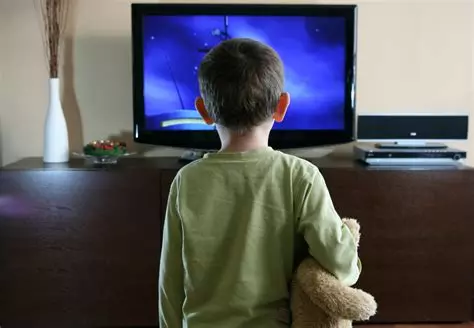Your cart is currently empty!

Influences in Children’s Television
A Call for Caution
Children’s television is a powerful tool that shapes young minds, often in ways that parents may not fully recognize. The widespread use of experimental psychology in these programs, combined with an imbalanced promotion of collectivist and individualist concepts presented under the guise of “empathy,” sets the stage for more profound identity manipulation later in life. This manipulation occurs through social conditioning in schools or through the promotion of what some believe to be gender misinformation, ultimately stifling individuality. Given these concerns, it is crucial to reconsider the role of children’s television in our homes and its potential impact on our children’s development.
Propaganda and Experimental Psychology in Children’s Television
Children’s television is designed not just to entertain but to engage and influence. The use of psychological techniques to capture young viewers’ attention is well-documented. For instance, in “The Age of Propaganda: The Everyday Use and Abuse of Persuasion,” Anthony Pratkanis and Elliot Aronson discuss how media can subtly manipulate audiences, including children, by leveraging psychological principles like repetition and emotional engagement. These techniques, while effective in keeping children glued to the screen, can also serve more insidious purposes. When these methods are used to subtly promote specific ideologies, they cross the line into propaganda. Marie Winn, in “The Plug-In Drug: Television, Computers, and Family Life,” echoes this sentiment, suggesting that television can shape children’s perceptions and behaviors in ways that parents might not anticipate.
This concern is further reinforced by Nigel Hollis in “The Psychology of Advertising,” where he explores how psychological principles are employed in media, particularly in advertisements aimed at children. The techniques used to capture children’s attention are not inherently harmful, but when they are utilized to promote specific worldviews or behaviors, they can contribute to a form of propaganda that shapes children’s minds in subtle yet profound ways.
The Bias Towards Collectivist Concepts and the Impact on Individuality
Many children’s programs emphasize themes of teamwork, cooperation, and understanding others’ feelings. While these are important social skills, there is a growing concern that the emphasis on group dynamics may overshadow the development of individualism. In “The Coddling of the American Mind,” Greg Lukianoff and Jonathan Haidt discuss how educational trends, including those that focus on group identity, can sometimes stifle individual expression. They argue that while empathy and cooperation are important, they should not come at the expense of teaching children to think for themselves and value their individuality.
This perspective is supported by Christina Hoff Sommers in “The War Against Boys,” where she critiques certain educational practices that prioritize collectivist ideals over individual development. She suggests that this shift in focus may be detrimental to children’s ability to develop a strong sense of self, ultimately leading to a generation that is more conformist and less able to think critically and independently.
Identity Manipulation and Gender Misinformation in Schools
The manipulation of children’s identities, particularly through the promotion of gender-related content in schools, is a contentious issue. Abigail Shrier, in her book “Irreversible Damage: The Transgender Craze Seducing Our Daughters,” discusses how schools and media can play a significant role in shaping children’s gender identities, often in ways that may not align with their biological reality. Shrier argues that this can lead to confusion and distress, as children are encouraged to question their identities at an age when they are still developing a sense of self.
Ryan T. Anderson, in “When Harry Became Sally: Responding to the Transgender Moment,” offers a critical perspective on how gender identity issues are presented in schools. He suggests that what some view as efforts to promote inclusivity and respect for diversity may, in fact, contribute to misinformation and confusion among young people. Anderson’s work highlights the need for a more balanced approach that respects biological realities while also supporting children in their development.
The Importance of Critical Media Consumption
Given the concerns outlined above, it is crucial for parents to approach children’s television with a critical eye. While not all programming is harmful, the potential for media to influence young minds in unintended ways is significant. By being mindful of the content their children consume and promoting an environment that encourages critical thinking and individual expression, parents can help mitigate the potential negative impacts of children’s television.
Read More:
For those interested in exploring these issues further, the following resources provide a deeper understanding of the concerns discussed in this article:
- “The Plug-In Drug: Television, Computers, and Family Life” by Marie Winn
- “Amusing Ourselves to Death: Public Discourse in the Age of Show Business” by Neil Postman
- “The Age of Propaganda: The Everyday Use and Abuse of Persuasion” by Anthony Pratkanis and Elliot Aronson
- “The Coddling of the American Mind: How Good Intentions and Bad Ideas Are Setting Up a Generation for Failure” by Greg Lukianoff and Jonathan Haidt
- “The War Against Boys: How Misguided Policies Are Harming Our Young Men” by Christina Hoff Sommers
- “Irreversible Damage: The Transgender Craze Seducing Our Daughters” by Abigail Shrier
- “When Harry Became Sally: Responding to the Transgender Moment” by Ryan T. Anderson
- “The Effects of Television on Children: What the Experts Believe” by the Journal of Communication
- “The Psychology of Advertising” by Nigel Hollis
- “Social Conditioning in Education” by the Journal of Educational Psychology
- “Gender Identity and Gender Confusion in Children and Adolescents: A Review” by the American Psychological Association

Leave a Reply